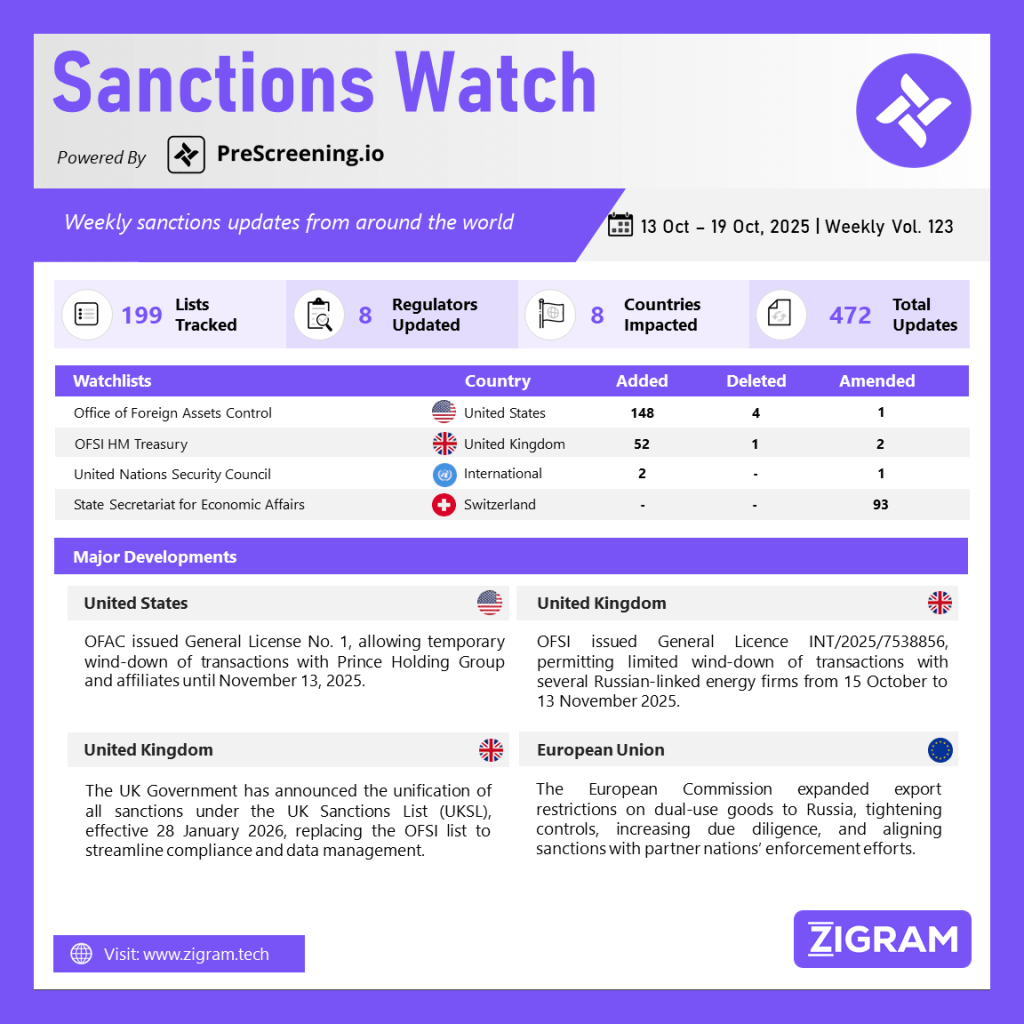Sanctions Watch Vol 123
In the latest edition of our Sanctions Watch weekly digest, we present significant updates on sanction watchlists and regulatory developments.
U.S. Treasury Issues General License to Wind Down Transactions with Prince Holding Group and Affiliates
The U.S. Department of the Treasury’s Office of Foreign Assets Control (OFAC) issued General License No. 1 under the Transnational Criminal Organizations Sanctions Regulations (31 CFR part 590). The license authorizes the temporary wind-down of transactions involving four entities recently designated and blocked under these sanctions. The entities include Prince Holding Group, Prince Bank Plc., Prince Huan Yu Real Estate Cambodia Group Co., Ltd, and any other entities in which these organizations collectively or individually hold a 50 percent or greater ownership interest.
This authorization permits U.S. persons to engage in transactions ordinarily incident and necessary to the wind-down of existing activities with the sanctioned entities through 12:01 a.m. EST, November 13, 2025. However, any payments to these blocked entities must be made into blocked accounts in accordance with OFAC regulations.
The license does not authorize any transactions beyond those explicitly described, nor does it apply to other persons sanctioned under the Transnational Criminal Organizations Sanctions Regulations. The notice was signed by Bradley T. Smith, Director of OFAC, underscoring the Treasury’s continued enforcement of global anti-criminal organization sanctions while allowing limited time for businesses to disengage from prohibited dealings.
UK Issues Temporary General Licence Allowing Wind-Down of Transactions with Russian Energy Entities
The UK Office of Financial Sanctions Implementation (OFSI), under HM Treasury, issued General Licence INT/2025/7538856, pursuant to Regulation 64 of the Russia (Sanctions) (EU Exit) Regulations 2019. The licence authorizes limited and temporary permissions for persons and financial institutions to wind down or divest transactions involving several Russian-linked energy entities.
The designated companies covered under this licence include Nayara Energy Limited, National Pipeline Group Beihai Liquified Natural Gas Co Ltd, Shandong Yulong Petrochemical Company, Shandong Baogang International Port Co, Jingang Port Co, Shandong Haixing Port Co, and their subsidiaries. These entities are collectively referred to as the Designated Parties (DPs).
The authorization allows individuals, organizations, and Relevant UK Institutions—such as banks, clearing houses, and payment service providers—to complete activities necessary for the closure of positions or disengagement from ongoing transactions with the DPs. The licence is valid from 15 October 2025 until 13 November 2025.
All parties making use of this authorization must maintain accurate records for at least six years, and the licence does not permit any actions beyond what is explicitly stated. HM Treasury retains the right to revoke, vary, or suspend the licence at any time. This measure provides a structured wind-down period while upholding the broader framework of the UK’s Russia sanctions regime.
UK Government Announces Transition to a Unified Sanctions List for Simplified Compliance by 2026
The UK government has announced that it will consolidate its sanctions designations into a single list the UK Sanctions List (UKSL), effective Wednesday, 28 January 2026, at 09:00 GMT. This change will mark the closure of the Office of Financial Sanctions Implementation (OFSI) Consolidated List of Asset Freeze Targets.
The update, published on 13 October 2025 by the Foreign, Commonwealth & Development Office (FCDO), HM Treasury, and the Office of Financial Sanctions Implementation (OFSI), aims to simplify sanctions compliance for businesses and organizations by removing duplication and streamlining checks.
The UK Sanctions List, first launched in 2020 under the Sanctions and Anti-Money Laundering Act 2018 (SAMLA), will remain the sole, authoritative source for all sanction’s designations. Businesses currently relying on the OFSI Consolidated List or the ‘OFSI Group ID’ must update their systems to use the UKSL’s ‘Unique ID’ identifier instead.
To support the transition, new data formats — CSV, PDF, and TXT — will be added to the existing ODS, ODT, HTML, and XML formats by the end of 2025. The government will also enhance the UK Sanctions List search tool with improved functionality, including fuzzy logic searches, to make it more user-friendly.
While the OFSI Consolidated List will no longer be updated after January 2026, historical Group IDs will remain valid for reporting and licensing purposes. Designation notices will continue to be published for all types of sanctions designations.
Businesses are advised to switch to using the UK Sanctions List immediately to ensure compliance before the transition date.
EU Expands and Clarifies Export Restrictions on Dual-Use Goods and Advanced Technologies to Russia
The European Commission released updated guidance on export-related restrictions for dual-use goods and advanced technologies under Council Regulation (EU) No 833/2014, as amended by subsequent regulations through Council Regulation (EU) 2025/395. These measures further strengthen the EU’s restrictive framework in response to Russia’s continued aggression against Ukraine, aiming to limit its access to critical technologies and industrial capacities.
The guidance consolidates rules under Articles 2, 2a, 2b, and 2d, detailing how exporters and competent authorities should interpret and implement prohibitions, exemptions, and derogations. The regulation broadly prohibits the sale, supply, transfer, or export of dual-use items and advanced technologies to Russia, including for civilian use, unless explicitly exempted. Limited exemptions cover humanitarian, medical, and cybersecurity-related purposes, while derogations require prior authorization for specific cases such as civil nuclear cooperation or space programs.
A major update introduces stricter controls on the transit of restricted items via Russia, expanded due diligence expectations for EU exporters, and the List of Common High Priority Items—50 sensitive components frequently found in Russian military systems, such as microchips, sensors, and manufacturing tools.
This revision reinforces the EU’s coordination with partner countries including the U.S., UK, Japan, and Canada, ensuring alignment on export restrictions and anti-circumvention mechanisms. Overall, the FAQs provide clarity to exporters, while tightening enforcement against sanctions evasion and enhancing the protection of EU supply chains.
Know more about the product: PreScreening.io
Click here to book a free demo.
Sanctions Watch is a weekly recap of events and news related to sanctions around the world.
- #OFAC
- #Sanctions
- #GlobalSecurity
- #FinancialSanctions
- #Compliance
- #USTreasury
- #UKTreasury
- #OFSI
- #Russia
- #EuropeanUnion
- #GeneralLicense

